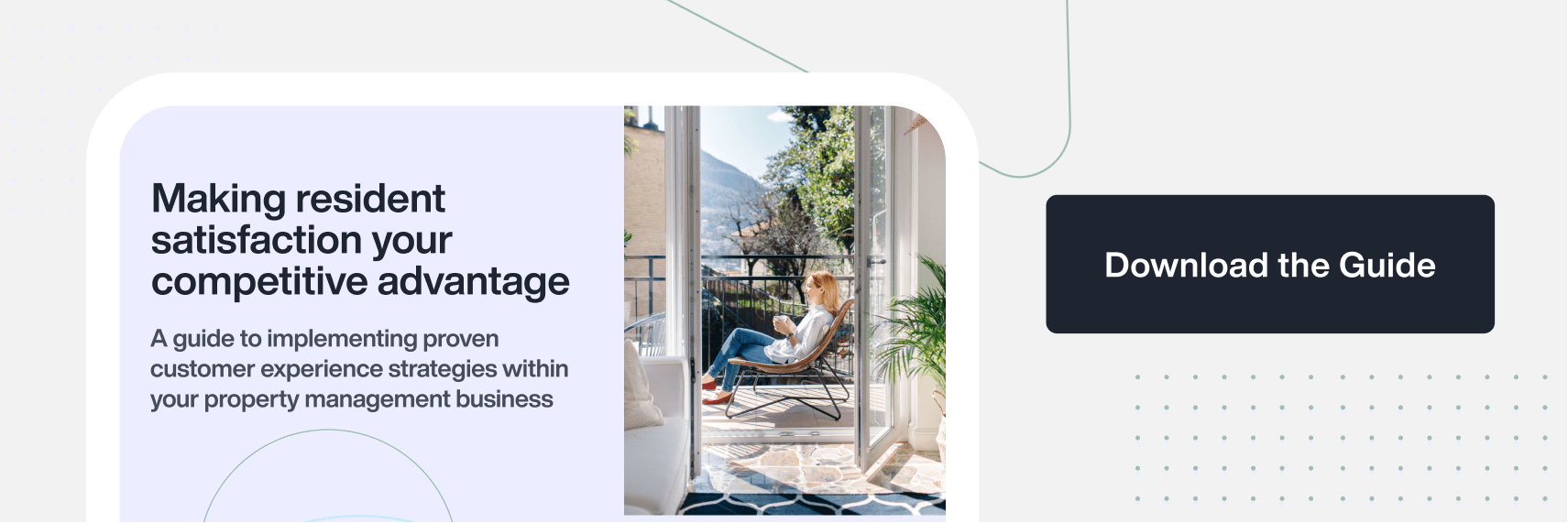Published on April 4th, 2023
By Brittany Benz
Over the last few years, residents’ expectations have shifted drastically, and property management companies are recognizing the need to re-evaluate and improve their customer experience to keep up. It’s certainly no easy task: record-high inflation cuts into revenue, ongoing supply chain disruptions present unique challenges, and workforce shortages continue.
But prioritizing customer experience can help your property management company stay competitive, retain current residents, and achieve new business goals. Here, we’ll take a deep dive into what customer experience is, why it matters, and how you can enhance your own strategy for success.
What is customer experience?
Simply put, the term “customer experience” (commonly abbreviated as “CX”) describes how customers feel about doing business with your company. The better your customer experience is, the more favorable people will feel about your organization.
However, it’s important to note that customer experience is the sum total of every single interaction a person has ever had or will have with a business. That means one-off interactions contribute to the customer experience, but every single experience combined creates the complete customer experience.
To put this into context, think about a brand you love or a company you enjoy doing business with. You’ve likely had multiple, consistently positive interactions with them that have added up to a great overall customer experience for you.
While “customer service” and “customer experience” are often used interchangeably, they are not the same. Customer service is just one component of the entire customer experience.
In addition, there are different types of experiences for different audiences. For example, “resident experience” in the property management industry may mean the same as “customer experience,” but your business will also have an employee experience, vendor experience, and owner experience, just to name a few.
Why customer experience matters
As you likely realize from your own personal and professional experiences, consumers who feel cared for and who have a consistently positive experience are more likely to remain loyal to a company and promote it to others. In essence, a great customer experience creates a positive engagement cycle that benefits everyone involved by building loyal customers, creating more-fulfilled employees and increasing success for businesses.
Today, positive customer experiences are the new standard for doing business. It’s no longer merely a nice-to-have — it could literally be a make-or-break for your customers:
- 74% of customers say they’re likely to buy based on experience alone (Forbes)
- 77% of consumers consider a company’s customer experience to be just as important as the quality of its products and services (Forbes)
- Customers are 2.4 times more likely to stay a customer when companies solve problems quickly (Forrester)
Form a CX foundation by measuring customer satisfaction
Before you begin to enhance your customer experience, it’s important to establish a benchmark by assessing how satisfied your customers are currently. To do so, look at few key performance indicators (KPIs):
- Referral rate: Only highly satisfied and happy residents will refer others to you. Look at your guest cards to see how many referrals you had last year, then calculate the average rate at which those prospects turned into residents.
- Resident renewal percentage: If you’re not seeing at least 45% to 55% resident retention, you likely have disgruntled residents. Check your annual renewal rate and compare it to previous years to see how you’re measuring up.
- Satisfaction with service: In this case, service refers to maintenance and office employees. Consider sending out a Net Promoter® Score survey to understand your customers’ satisfaction and level of loyalty.
Work on three key areas to improve your customer experience
1.) Improve resident communication
If you polled renters on what property management could do to improve the resident experience, it’s highly likely communication is high on their lists. We saw this firsthand with results from our 2022 Resident Motivations report, which revealed that more than one-third of residents said proactive communication is more important than ever before.
But improving communication takes more than just increasing content frequency. Instead, it’s about understanding how residents want to correspond. Expanding your communication tools to more modern methods — particularly text messaging and email — can keep residents in the loop in the ways they prefer.
In addition, make sure communication is clear and professional, especially in the case of late payment reminders, package delivery notifications, time-sensitive information, and maintenance reminders. To send community-wide information, take advantage of bulk email to get the message out to everyone at the same time.
2.) Make doing business with you easier and more convenient
Put yourself in your residents’ position and ask yourself:
- How difficult is it to pay rent?
- Do residents have to come into the office to renew their lease?
- If a resident submits a maintenance request, do they have to repeatedly follow up with the front office to make sure it’s taken care of?
Convenience is crucial when it comes to satisfaction, which is why it’s important to implement user-friendly technology that makes life easier for your residents and provides self-service options, including:
- Virtual showings
- Online applications and leasing paperwork
- Online resident portals
- Online rent payments
- Online maintenance requests
- Email and text message communication options
- Online lease renewals
Don’t forget: the easier, simpler, and more streamlined doing business with you is, the better the overall resident experience becomes.
3.) Provide a human touch
Part of being a great property manager is simply focusing on your customers by giving them the attention they need and deserve. But when you’re overloaded with tedious tasks like manually entering applications, calling previous landlords to verify information, and entering data by hand, you have far less time to provide outstanding service.
Using technology to automate tasks can free up the time needed for teams to provide a more personalized and human touch where it matters most, such as personally reaching out to residents or planning community events like an outdoor movie night or happy hour.
The tips and insights above can help you get started, but remember that improving the customer experience takes time. It will be an ongoing effort, and consistency is key.
For even more ideas on how you can improve the customer experience for your residents, download our free guide below.










BNB Rental Group
—
Indeed! especially if your rental is on Airbnb listings, customer experience should be good at all times!